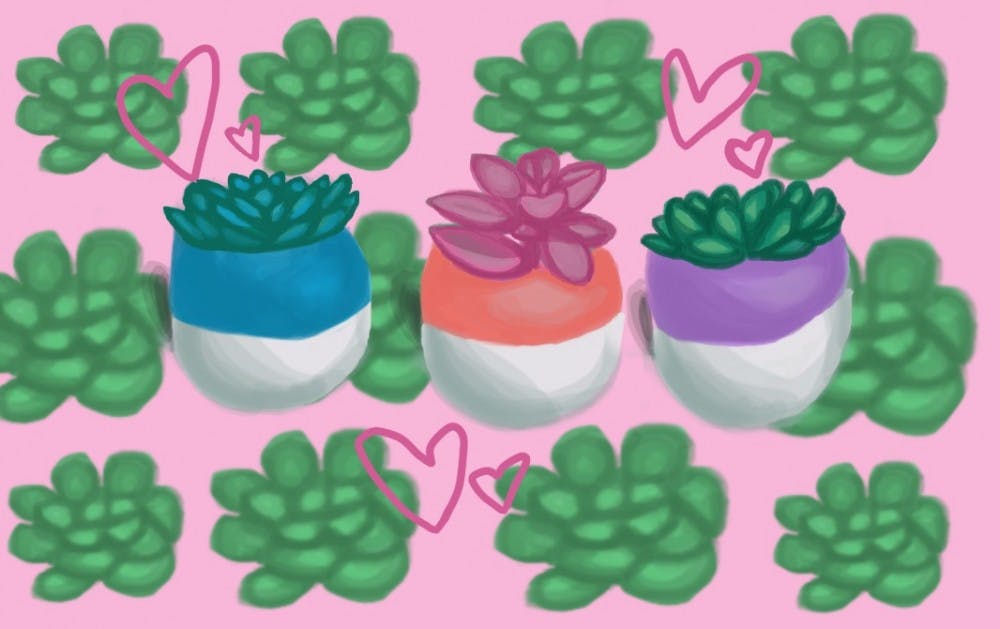Whether it's through a collection of tiny succulents or one five-foot-tall fern, people are increasingly using caring for houseplants as a self-care technique to cope with depression and anxiety disorders — the most common mental illnesses in the U.S.
ASU students are among those who have adopted roles as “plant parents,” bringing all kinds of greenery into dorms and apartments to relieve some of the tensions built up over the semester and give them a lush, living, growing source of self-care.
Linda Ruvalcaba, a Phoenix counselor and clinical manager, said gardening can be a practice in mindfulness, grounding one in the present moment instead of allowing one's mind to wander.
“When we’re dealing with depression and anxiety, we’re stuck in our heads,” she said. “We’re not right here, right now. And doing these kinds of activities helps bring you back to right here, right now, to the plant in front of you.”
Ruvalcaba said gardening embodies what she called “grounding techniques,” which are exercises that utilize the five senses as a way to stay focused on what is here and now, something people with anxiety and depression often struggle with.
Rebekah Winters, president of Cultivate Downtown and a senior studying nutrition, said giving students the opportunity to “de-stress” is a primary function of the gardening club.
“I want it to be something that they’re going to have fun doing and not going to have to think about school because I know school can be stressful,” she said.
Winters sent an email to all potential club members over the summer, asking them to explain why they wanted to join Cultivate Downtown.
“It was about 14 people and they all said to me, ‘I want to be part of Cultivate because I know I’m going to have a hard semester this semester, and I need something that’s going to be an outlet,’” she said.
Claire Duffrin, a sophomore studying psychology, said she uses her succulents to keep her from getting overwhelmed with school.
“I'm such a nerd – I love school, I love having good grades, I love all that stuff,” she said. “And having depression really put kind of a block on that because you can't really focus on what you want to do and what your goal is. So, I think that it's really helped me be able to have that foundation of waking up and being able to feel OK and carry on with my day.”
Coby Bruckner, co-owner of Pueblo, which boasts itself as "the only nursery in downtown Phoenix," said he believes plants are good self-care tools because they involve the act of caring for something.
“I think people want to have something to care about, and it’s something that benefits you in a different way than buying a book does,” he said. “It’s still a material object, but it’s going to grow, and it’s going to be something you can nurture and will respond to you … it’ll give you good air, (and) you’ll feel the energy off that. You’ll feel the calm around it.”
Research supports this, as a 2008 study found that elderly residents in assisted living facilities “showed a significant increase in mastery, self-rated health and self-rated happiness” after participating in indoor gardening classes and practicing basic houseplant care in their homes.
Similarly, a 2003-04 study focusing on the Wright Theory found that green is a color associated with balance and reassurance, adding that it “strikes the eye in such a way as to require no adjustment whatever and is, therefore, restful.”
However, both Ruvalcaba and Winters said it is necessary people don't rely solely on any one practice, including gardening, to cope with mental illness.
“Gardening’s a great start to just bringing you into the moment, but there are other practices that I think would help go hand in hand with that,” Ruvalcaba said. “Maybe like meditation, therapy, connecting with friends over a cup of coffee — just be more mindful of the activities we’re engaged in.”
Bruckner believes that gardening holds benefits for all — including those not affected by mental illness.
“I think so many of our environments are very clouded right now — like our political environment, our natural environment — so I think just being able to focus on such a small scale (such) as this one plant in my house is very easy for people to understand and focus on,” he said.
Small accomplishments, like caring for a plant, Bruckner said, can set someone up to feel more confident in tackling larger tasks.
“If I get this one plant to (grow) a new leaf, then I’m doing something right and everything else will be okay, too," he said. "It’s a constant reminder that a new leaf is coming. I can take care of this and make this thing do well, so I’ll take care of myself, and I can take care of other people too.”
Reach the reporter at mrobbin9@asu.edu or follow @MelissaARobbins on Twitter.
Like The State Press on Facebook and follow @statepress on Twitter.




